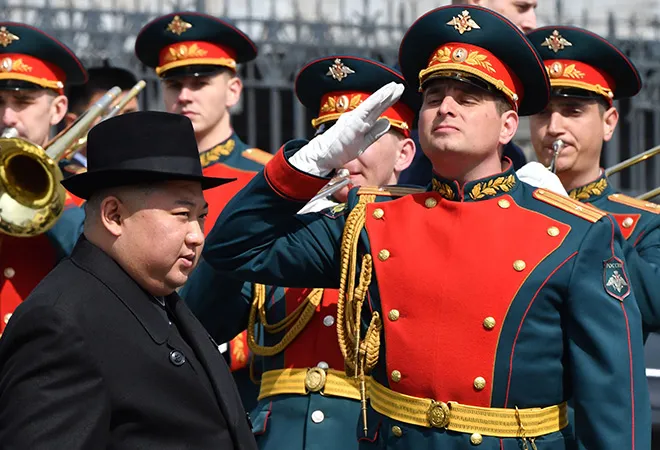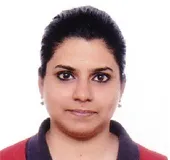-
CENTRES
Progammes & Centres
Location

With the North Korean food security landscape continuing to run in deep waters, it is fairly reasonable to delve into the aspect of international development cooperation that has been rigorously underlined, keeping in view SDG 17 of Agenda 2030. Over the years, North Korea’s acute food shortage coupled with extreme natural disasters and the autocratic bent of Kim Jong-un’s government that rampaged against basic human rights has resulted in a crisis. Furthermore, its nuclear weapons and missiles ballistic programme has landed Pyongyang amidst a slew of international sanctions imposed by the UN, translating into suspension of economic trade; a nuclear arms embargo; and a stop to export of coal and other minerals; and a cut to imports of crude oil, petroleum products and luxury goods, etc. Nonetheless, humanitarian aid in the sectors of health, water, nutrition, and agriculture are allowed to be undertaken by the UN agencies in North Korea.
North Korea’s acute food shortage coupled with extreme natural disasters and the autocratic bent of Kim Jong-un’s government that rampaged against basic human rights has resulted in a crisis
However, the idea of development cooperation has never been an unfussy affair. The allocation, distribution, and scale of humanitarian aid, operated by the Organisation for Economic Co-operation and Development (OECD) donors and the emerging global South partners, reveals a fragmented topography, majorly portrayed by strategic interests that are transactional in nature. Going beyond ideologies, this has also made the world increasingly cohesive and close-knit with connectivity and partnerships offering novel templates of growth and development. Moreover, the advent of a new global order reflects a dichotomy of cooperation; one, where the countries are seeking to be strongly involved in geostrategic ways to capture leadership; and second, where alternative styles of diplomacies are coming to the fore. The idea of capacity building, in the form of infrastructures or technology exchange in developing economies, for instance, can also be viewed from the prism of gaining visibility, securing positions of confidence and a new gateway to global leadership.
Considering that international development cooperation is premised on providing the not-so-prosperous with an ease of access to global public goods, it inadvertently evokes humanitarian sensitivities and ethical impressions. The case of North Korea, however, is a tad complicated. Its engagement as a ‘hermit kingdom’ with the outside world has been unusually restricted owing to Kim Jong-un’s dictatorial regime secretively functioning towards isolating the country from global eyeballs. A series of natural disasters in the 1990s combined with a stagnating economy resulted in an influx of humanitarian aid. Simultaneously, the North Korean regime continued to amass nuclear armoury by launching submarine-based missiles and setting up new facilities. The UN intensified its sanctions in line with Pyongyang’s nuclear expansionist activities.
The idea of capacity building, in the form of infrastructures or technology exchange in developing economies, for instance, can also be viewed from the prism of gaining visibility, securing positions of confidence and a new gateway to global leadership.
Nonetheless, strategic narratives and power politics play a vital role in aid delivery tactics. It can be most certainly stated that China is one of its biggest food aid provider although there is lack of updated statistics with barely any monitoring system in place. Providing vital food grains, fertilisers, petroleum, cooking coal, and other textile equipment through maritime channels, Pyongyang is heavily dependent on its Asian neighbour. Despite the sanctions and trade restrictions, it has been reported that illicit imports and exports of metallurgical products and other minerals were carried out by Pyongyang in its attempt to generate revenue for the survival of its economy. This has, however, taken a severe hit given the North Korean Premier’s stern instructions of COVID-19 protocols of quarantine and no contact with outsiders.
Furthermore, Russia and the USA along with several European states, have also been providing humanitarian aid to North Korea through both bilateral and multilateral mediums, such as the UN, World Food Programme (WFP), and other international non-governmental organisations (INGOs). Naturally, the imposition of sanctions and delays thwart the delivery of aid when combined with Kim’s inherent and long-drawn fear of inflow of information which poses a pertinent threat to the survival of his regime. This also explains his decision of shutting down the doors of North Korea in 2020, following the outbreak of the pandemic. The country further curled into segregation by being one of the first nations to close its borders to ward off the deadly virus while also protecting its state ideology.
Between 2011 and 2019, experts at the UN observed that the flow of funds from major donors to Pyongyang deteriorated drastically. For example, in 2017, approximately US $35 million were received by North Korea whereas the UN appeal stood at an almost whopping US $120 million. Likewise, according to the UN’s WFP, North Korea’s food aid also witnessed a downward slide going down from an approximately 35,000 tonnes in 2015 to 14,000 tonnes in 2018. In this context, Washington’s strategic yet cautious pledge of US $1 million in 2017 to undertake UNICEF’s relief activities in the North Korean floods can be termed as an important step towards ramping up of humanitarian aid.
The ongoing pandemic has severely underscored the necessity of building resilient societies with robust healthcare infrastructures which is only possible with viable and effective partnerships.
Although, it is a given that humanitarian aid should be carried out with no political strings attached, it appears that a prime chunk of the funds is coming from the pocketbooks of countries who have strategic interests in the North Korean region. Take for instance, Beijing, which is constantly proliferating its activities in Asia, looks at North Korea from the perspective of great power rivalry with a tint of pragmatism, i.e., the Sino-US strategic competition in the Korean peninsula. Similarly, despite Washington’s unilateral sanctions on Pyongyang over the years, it is keen on rebuilding its diplomatic bridges by offering humanitarian assistance.
Yet, there is no end to the North Korean food security conundrum. Speculations are abuzz that Kim’s refusal to accept humanitarian assistance during the pandemic is negatively impacting the relief work carried out by WFP, driving it to suspend its activities in the coming few months. It then becomes an excessively difficult terrain for humanitarian aid institutions to live up to their moral responsibilities of protecting the marginalised sections of the North Korean population. Besides, the ongoing pandemic has severely underscored the necessity of building resilient societies with robust healthcare infrastructures which is only possible with viable and effective partnerships. Undoubtedly, international development cooperation reflects the ebbs and flows of donor motivations, in the case of North Korea, it is nothing but a sleeping elephant in the room. It would be interesting to observe how and who wakes it up, especially in a world dominated by the sustainability narrative.
The views expressed above belong to the author(s). ORF research and analyses now available on Telegram! Click here to access our curated content — blogs, longforms and interviews.

Dr Swati Prabhu is Associate Fellow with the Centre for New Economic Diplomacy at the Observer Research Foundation. Her research explores the interlinkages between development ...
Read More +